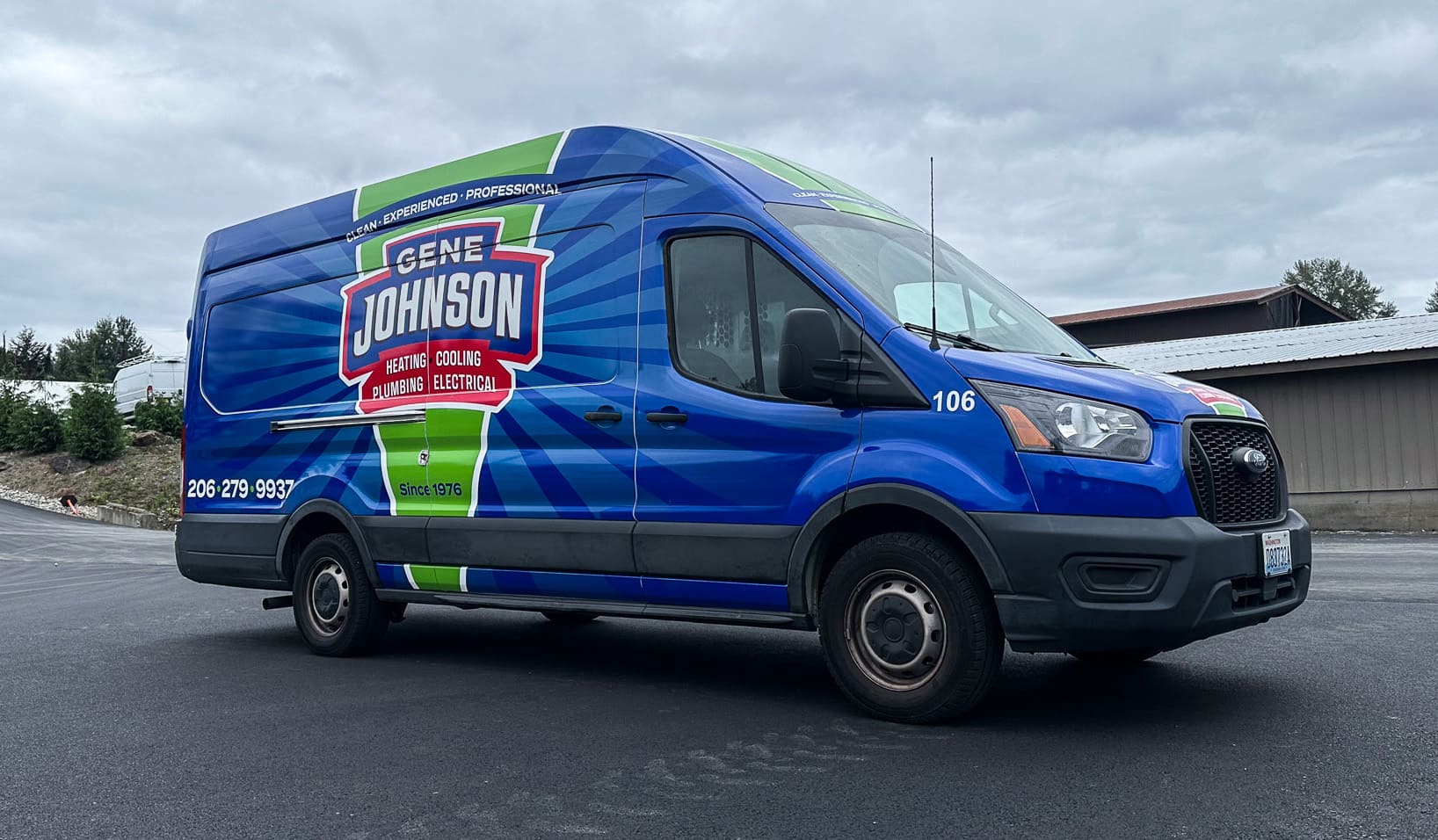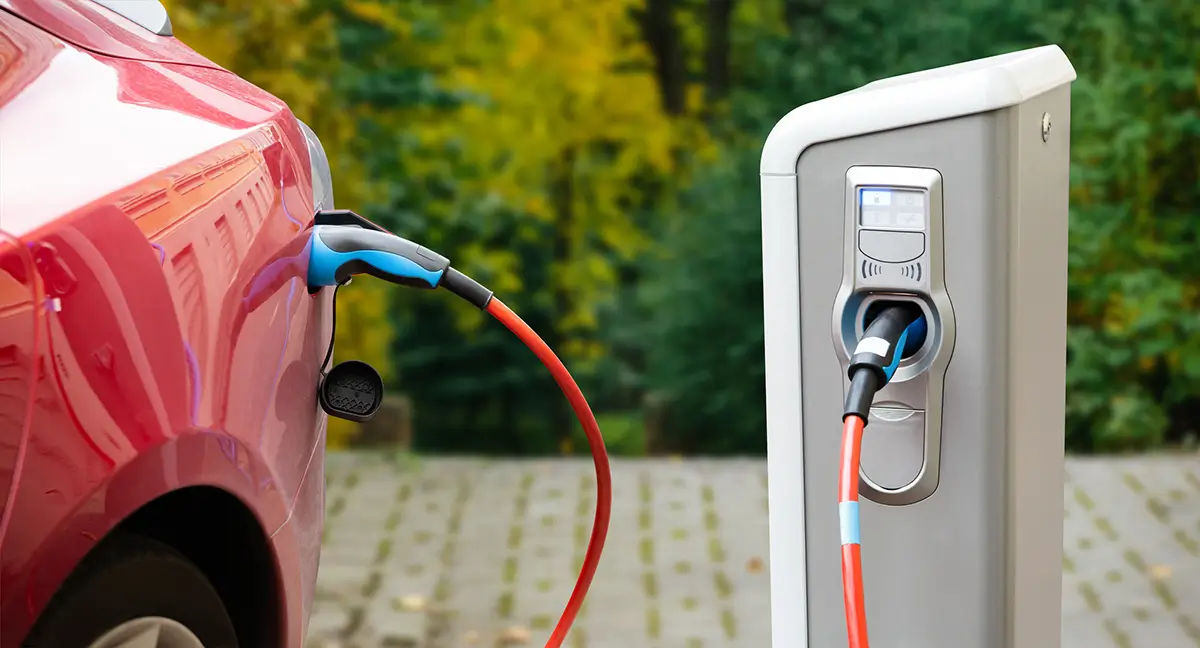Electric Vehicle Chargers
As environmentally-conscious drivers ditch gas pumps for electric charging stations, don’t settle for subpar electricians leaving your EV setup undercharged. Get the true masters of renewable energy from Gene Johnson – your certified EV charger experts, serving the region since 1976.
As a trusted, family-owned business energizing communities from Seattle to rural neighborhoods, we’ve built a stellar reputation for excellence in pivoting properties toward sustainability. Wherever electric vehicles need reliable power sources, you can count on our skilled team to architect and implement comprehensive charging solutions.
What electrifies our services is an unwavering commitment to honest, transparent work. No surprise volts or shorts – just master electricians leveraging the latest technology to accurately diagnose your needs and install effective, affordable EV charging upgrades that keep you perpetually powered up.
From basic Level 1 installations to industrial Level 3 charging station overhauls, our expertise extends far beyond plugging into a simple wall outlet. We approach every job with meticulous professionalism unmatched by amateur electricians who cut corners on safety.
Don’t gamble with unreliable “spark chasers” to meet your electric mobility demands. Invest in our superior charging station mastery – empowering Western Washington drivers towards an emission-free future for 48 years. Transform your fossil-fueled regret into renewable tranquility by calling (206) 792-7495 today.
0%
Or low-monthly Payments
*For 60 months on select services.
FREE
Diagnostics And Consultations On HVAC Systems
*Diagnostic or repair services are not included. This is a no-obligation consultation for homeowners interested in upgrading or replacing their HVAC and/or heating systems. Offer applies to residential properties only and must be scheduled during normal business hours.
EV Charger Installation
Accelerating into the sustainable driving future starts with a proper EV charger installation from the renewable power experts. Our certified electricians approach every installation as a comprehensive project – beginning with in-depth consultations to understand your charging needs and evaluate your property’s existing electrical system and infrastructure.
We then architect an intelligent charging solution, tailored to seamlessly integrate Level 1, Level 2, or industrial-grade Level 3 capabilities, matched to your driving habits, vehicle models, and budget considerations. Leveraging advanced load calculation methods, we map out the ideal placements and routing paths to ensure your electrical panel and wiring can safely handle increased power demands without overloading.
The installation process itself is executed with utmost professionalism and stringent safety protocols. Our technicians neatly route conduit and terminate connections to code, ensuring a clean, finished product. We walk you through the operating instructions and charging best practices once the new unit is activated and powered up successfully.
But our service extends far beyond just the installation. We aid in securing any federal, state, or local rebates, tax credits, and incentive programs to maximize your savings. Our team handles all permitting and inspections to certify your charging setup meets every requirement. And you receive documentation for your property records.
With certified workmanship backed by robust warranties, you can charge into your emission-free electric mobility future with supreme confidence and peace of mind. Our mission is getting you powered up and perpetually juiced for your sustainable journeys ahead.
EV Charger Upgrade
As electric vehicle charging technology rapidly evolves with faster speeds and smarter capabilities, upgrading your existing setup is critical for keeping pace with the cutting-edge. Gene Johnson’s comprehensive upgrade services elevate your system’s performance, charging rates, and intelligent functionality to align with the latest EV charging advancements.
Our process begins with thorough electrical evaluations and load studies to determine the optimal upgrading solutions. This could involve boosting your existing Level 1 or Level 2 charger to newer specifications with quicker charge times. Or we may recommend overhauling core electrical components like service panels, circuit wiring, and outlets to unlock fuller Level 2 or even Level 3 charging capabilities you’ve been lacking.
Whatever upgrade path makes the most sense, our team deftly executes the overhaul with zero downtime or disruptions to your property’s operations. We work neatly and to code, ensuring your upgraded system is safe, reliable, and primed to handle increased energy transmission.
But upgrading goes beyond just amping up charge speeds. It’s an opportunity to enhance conveniences like Wi-Fi/Bluetooth connectivity, electricity usage monitoring, charging schedulers aligned with off-peak rate periods, and integration with building energy management systems. Our certified electricians leverage cutting-edge hardware and software for intelligent charging control that maximizes efficiency and automation for your electrified lifestyle.
With upgraded chargers commissioned to deliver reliable performance backed by our workmanship warranties, you’re fully future-proofed to keep accelerating toward a renewable, emission-free driving reality.
EV Charger Repair
The most robust and advanced EV charging setups still require periodic repair and maintenance to preserve optimal longevity and performance over years of heavy usage. Whether your Level 1, Level 2, or Level 3 unit has stopped operating due to electrical faults, physical damage, or is experiencing issues like deteriorating charge rates, Gene Johnson’s certified repair technicians have you covered.
We begin with prompt diagnosis, leveraging specialized testing tools and inspection methods to trace any faults, error codes, or inefficiency root causes with precision. This could be hardware problems from failed components, circuit anomalies, or physical impacts. Or malfunctions may stem from software and control board issues throwing off charging functionality and communications.
Whatever the problem, our repair team resolves it decisively and professionally. We maintain a vast inventory of genuine OEM replacement parts for all major charger makes and models to restore your unit’s operation to original factory specifications. You can count on our code-compliant repairs to thoroughly eliminate any electrical hazards like ground faults, voltage fluctuations, overheating risks, or networking glitches leaving your charger a safety liability.
Our certified technicians follow the latest techniques and safety protocols for every repair job. We ensure your charger is brought back to a reliable, fully-functional state before completing repairs and re-energizing the system. You receive detailed documentation of all work performed, parts replaced, and a comprehensive quality assurance review.
With Gene Johnson’s repair services reinstating peak performance backed by efficiency and workmanship warranties, you can confidently keep charging into your electric driving lifestyle without disruptive breakdowns or safety concerns from neglected maintenance. We have you perpetually powered up.





Electric Vehicle Chargers FAQ
How Do EV Chargers Work?
Types of EV Chargers
Benefits of Installing an EV Charger at Home
Are EV Chargers Universal?
EV Charger Installation: DIY vs Professional Services
Do I Need to Upgrade My Home’s Electrical System for EV Charging?
Cost Factors for EV Charger Installation
How Long Does EV Charger Installation Typically Take?
What Maintenance Is Required for an EV Charger?
What is the Impact of EV Charging on My Electricity Bill?
How Do EV Chargers Work?
While the inner workings of electrical engineering may seem mystifying, EV chargers themselves operate on relatively simple principles to “refuel” your electric vehicle’s battery pack. At their core, these charging units leverage alternating current (AC) from the electrical grid and convert it into the direct current (DC) energy language your EV’s battery uses to store power.
The charging speed and overall process vary depending on the charger level. With a basic Level 1 setup using a standard 120V household outlet, AC alternates through the cable at the same rate as household electronics receive power. An onboard converter within your EV transforms this incoming alternating flow into DC energy, trickling into your depleted battery cells.
While convenient for occasional top-ups, Level 1’s slower charging rate of 3-5 miles of range per hour isn’t ideal for most drivers’ regular charging needs. That’s where Level 2 chargers come in as the residential sweet spot. Using 240V service, like that of an electric dryer outlet, these units pump higher AC voltage through a more robust converter to significantly increase the DC charge, flooding your batteries with around 10-60 miles of range per hour depending on the circuit’s amperage.
For truly rapid charging, ideal for road trips or commercial use, Level 3 chargers, also known as DC fast chargers, directly deliver DC energy to your EV’s battery without onboard conversion needed. These powerful station pumps can replenish over 200 miles of range in under an hour by essentially jump-starting your battery at its native DC language. They leverage unique multi-phase power distribution and liquid cooling to enable such blistering charge rates.
No matter the charger level, the core premise remains: converting AC grid electricity into the DC format your EV requires for efficient battery recharging. Higher voltage allotments and more advanced components are what enable quicker energy transfers for turbo-charged “refueling.” With the right charging station properly installed, you’ll always stay energized and powered up for miles of emission-free driving convenience.
Types of EV Chargers
While we’ve covered the basic charging level classifications, there’s more to unpack within each category when determining the ideal charger for your electric driving needs and property.
Level 1: The Accessibility Option
On the most basic end, Level 1 chargers utilize a standard 120V outlet found in every home. These portable units simply plug into any three-prong receptacle using the same Level 1 cord set included with your EV purchase. While excruciatingly slow, they’re an accessible option for infrequent top-off charging without any installation needed.
Level 2: The Residential Favorite
For most daily EV charging, Level 2 represents the happy medium between practicality and efficiency. These permanently-wired charging stations operate on 240V service, just like electric dryers. Level 2 chargers come in varied configurations – from humble 16-amp wall units to robust 48-amp pedestal or wall-mounted models, pumping DC juice faster.
Level 3: The Commercial Fuel-Up
When you need lightning-fast charging for a road trip or operating a public charging business, Level 3 is king. These powerful DC fast chargers bypass onboard AC-to-DC conversion to directly replenish batteries at blistering rates up to 350 kW. Requiring specialized electrical hardware and liquid cooling, they’re the priciest option for commercial properties only.
But capabilities extend beyond just charge speeds within these level categories. Varying models offer differing features like:
- Hardwired or portable/mountable units
- Smart connectivity for app control and monitoring
- Cable length and multi-vehicle charging ports
- Cold weather radiant heating for safe operation
- ENERGY STAR certified models for efficiency
With professionals guiding your selection, you can seamlessly integrate the Level 2 or 3 setup best aligned to meet your residential, fleet, or commercial charging demands. Gene Johnson evaluates your driving habits and electrical infrastructure to make an ideal match.
Benefits of Installing an EV Charger at Home
With electric vehicles steadily cruising into the mainstream, having a proper Level 2 charging station installed at your residence puts the future of sustainable driving convenience right in your garage. Upgrading from tedious Level 1 trickle charging opens up a world of advantages for EV owners looking to make petroleum-free propulsion their daily reality:
Effortless Overnight Recharging
Let’s face it – diligently unplugging your EV from a basic household outlet every evening only to replug and repeat daily is a tangled hassle. A dedicated Level 2 home charger streamlines your routine. Simply park and plug overnight while you sleep, waking to a fully replenished battery every morning without fossil fuel disruptions.
Maximize Your EV’s Range
Level 1’s 3-5 miles of range per hour of charging is a mere drip compared to Level 2’s robust 10-60 miles per hour output capabilities. With the higher voltage Level 2 delivers you maximize your EV’s performance for daily commutes and errand runs without range anxiety creeping in over long distances. Don’t let trickle charging constrain your emission-free driving experience!
Smarter Charging, Lower Utility Bills
Many Level 2 chargers integrate intelligent schedulers and app controls to optimize charging during off-peak, low-cost utility rate periods. Why dump money needlessly recharging at premium hours when automation and load balancing can handle it all at a fraction of the cost overnight? Pair your home charging setup with energy monitoring and your EV becomes a cost-saver.
Keep Charging in Inclement Weather
With reliable outdoor installation rated for all elements, Level 2 chargers enable safe year-round operation, impossible with makeshift indoor Level 1 setups susceptible to tripping hazards. Need to charge in the rain or during harsh winters? Not a problem with weatherproof pedestals that even include supplemental heating for cold conditions.
Enhance Your Home’s Resale Value
Homes pre-wired with permanent Level 2 EV chargers demonstrate valuable eco-consciousness that measurably boosts resale value and buyer demand. With sustainability only rising in priority for homebuyers, upgrading your electrical for turn-key EV charging checks an increasingly attractive box.
From the effortless routine of overnight charging at home to maximizing your EV’s range potential and lowering electricity costs – installing a professional Level 2 charging station opens the road to true zero-emission driving freedom. Why settle for anything less in powering your electrified lifestyle?
Are EV Chargers Universal?
As you explore making the seamless transition to a Level 2 home charging oasis, one question may give you pause: With all the different electric vehicle makes and models accelerating into the marketplace, are EV chargers a universal one-size-fits-all solution?
The short answer is yes…and no. Allow us to illuminate the nuances.
At their core, EV chargers essentially speak the same universal language of electricity delivery. Whether you drive a Tesla, Ford, Chevy, or any other plug-in brand, Level 1 and Level 2 chargers fundamentally supply AC power that any onboard vehicle system can accept and convert to DC battery energy.
However, the charging connector hardware – the plug linking the charger to your EV – does differ between automotive manufacturers. Just like you wouldn’t borrow a micro-USB phone charger for an Apple device, your Nissan LEAF expects a different connector from what a Porsche Taycan would need.
Most chargers thus come equipped with the matching connector cable for whichever brand you drive, streamlining the plug-and-play process. Some units even offer multiple tethered connectors enabling you to charge various EV makes visiting your home.
Alternatively, chargers can be ordered connector-less, allowing universal compatibility with any vehicle by using the portable charging cord included with your EV purchase to complete the final connection.
Thankfully, Level 2 charging is now standardized with the common J1772 connector supported across all automakers selling EVs in North America. So while universal charging exists across brands at these lower AC levels, you’ll simply want to ensure your home’s new Level 2 station comes equipped or is configured properly to interface with your specific EV’s charging inlet when our professional electricians install it.
Moving into the DC fast charging realm of Level 3, infrastructure standardization gets trickier with unique connectors like Tesla’s proprietary design and the Combined Charging System (CCS) used by most other automakers. But for reliable home Level 2 charging, universal compatibility is achievable with the right professional guidance.
EV Charger Installation: DIY vs Professional Services
With purchasing an EV charger unit being relatively straightforward, you may wonder if professional installation services are truly necessary. After all, doesn’t setting up a Level 2 charger just involve mounting it to the wall and plugging it into an existing 240V outlet? In theory, sure – but in practice, a world of crucial considerations come into play that simply plug-and-playing risks jeopardizing your safety, home infrastructure, and long-term operational reliability.
The Perils of DIY Charger Installation
While a daring DIY spirit can tackle many home projects admirably, EV charging station setup demands extensive electrical expertise most homeowners simply don’t possess. Improper installation carries serious risks like:
- Overloading circuits and creating fire hazards
- Failing to adhere to local electrical codes
- Improperly calculating electrical loads and service needs
- Mistaken wiring resulting in excessive heat buildup
- Physical installation issues like tripping hazards
- Voided manufacturer warranties due to improper setup
Even missing one critical step in the installation process opens up your home to potentially devastating consequences. Professional installation eliminates these grave risks entirely.
The Professional Installation Advantage
In bringing decades of electrical mastery and EV charging expertise, certified installers from Gene Johnson ensure every Level 2 setup is executed with maximized safety, reliable longevity, and code-compliant precision as core priorities:
- Comprehensive load calculation assessment of your home’s electrical needs
- Expert determination of ideal charger location and layout design
- Guaranteed capacity to handle increased power demands safely
- Proper conduit routing, wiring techniques, and tidy finish work
- Consultations to score available rebates and incentives
- Securing all required city permits and inspections
- Ironclad warranty protection on parts and labor
Rather than risking costly oversights by taking battery charging into your own hands, professional installation circumvents future hazards and returns on your EV investment through flawless setup from day one. Your emission-free driving lifestyle is simply too important not to treat it with the professionalism it deserves.
Do I Need to Upgrade My Home’s Electrical System for EV Charging?
After hearing about the necessities of professional EV charger installation, you may be wondering – what if my home’s existing electrical system just isn’t capable of supporting these increased power demands? Will major (and costly) panel upgrades be required before I can properly plug in?
The answer depends on your residence’s age, electrical capacity, and the charging levels you intend to utilize. But don’t automatically assume drywall demolition nightmares – Gene Johnson’s certified electricians excel at meticulously evaluating your infrastructure to determine upgrade needs, if any.
For Basic Level 1 Charging
If you only plan to take advantage of the Level 1, 120V charging capabilities included with your EV’s standard equipment, then no electrical work should be needed in most modern homes. Level 1 draws minimal power on par with running a laptop or TV, well within the capabilities of almost any household outlet and circuitry. While Level 1 is excruciatingly slow, it can handle overnight top-offs in a pinch without any upgrades.
For the Recommended Level 2 Charging
However, if you wish to integrate the real perk of a permanent Level 2 charging station operating on 240V service for vastly quicker recharging, upgrades become more likely depending on your home’s electrical makeup.
Homes Built After the 1960s
Most residential properties constructed in relatively modern decades were pre-wired for high-power 240V appliances like electric dryers or ovens. If your electrical service panel has ample capacity and an existing unused 240V outlet is accessible in your garage or desired charging area, your home may only need minor inexpensive upgrades to make it Level 2 ready. This could involve installing a dedicated EV charging circuit and upgrading to a charger outlet with sufficient amperage.
Older Homes/Inadequate Service
For residences predating the 1960s or with clearly overtaxed existing service, more extensive (and costly) electrical work like panel replacements and circuit rewiring may be unavoidable for Level 2 charging integration. Undersized or overloaded panels simply cannot accommodate these increased power demands safely. This upgrade scope gets determined during the professional evaluation process.
No matter how sophisticated or antiquated your electrical system, Gene Johnson’s team finalizes solutions to equip your home for the EV charging performance you deserve – without cutting corners on safety. Upgrades provide peace of mind down the road.
Cost Factors for EV Charger Installation
Like any major home upgrade, costs for integrating an EV charging setup can vary considerably based on several determining factors. As professionals committed to transparency, Gene Johnson’s electricians provide upfront fixed-pricing through detailed evaluations – never with surprise fees. Understanding what variables impact installation expenses helps homeowners budget accurately.
Charger Unit and Mounting Hardware
This foundational cost covers the EV charger unit itself, selected based on your charging needs, vehicle compatibility, and feature preferences like WiFi connectivity or cord length. Permanent hardwired Level 2 stations run $500-$2,000+ while basic Level 1 portable units are $300-$700. Mounting pedestals or wall-hanging brackets are additional costs.
Electrical Service Upgrades
For homes requiring service panel replacements, circuit rewiring, or adding dedicated EV charging circuits to handle increased 240V power demands, these intensive electrical upgrades comprise the most potentially costly aspect at $1,500-$10,000+. Factors like panel accessibility, home age, and the extent of work required drive pricing variations.
Installation Labor and Permitting
With EV charging installation being a highly technical undertaking to ensure safety and code compliance, certified labor costs cover electricians’ physical installation time, which includes:
- Comprehensive pre-install evaluation of your home’s electrical infrastructure
- Calculating electrical loads and mapping out the ideal charger location/routing
- Intricate wiring, conduit placement, and tidy finish work
- Securing city permits, passing inspections, and submitting rebate paperwork
Ongoing Electricity Usage
Finally, there are long-term costs incurred from increased electricity consumption powering your EV charger regularly. Switching from gas to electric charging adds $25-$100+ monthly to utility bills, depending on driving habits and Time-of-Use electricity rates. Money-saving strategies include charging only during off-peak hours.
By prioritizing quality components and professional installation workmanship, you’re investing in a safe, reliable, and enduring charging solution to maximize your electric driving convenience for years to come. When it comes to making sustainability upgrades, cutting corners is extremely penny-wise and pound-foolish.
How Long Does EV Charger Installation Typically Take?
When prepping your home for an upcoming EV charger installation, you’ll likely want to understand the general time commitment required. While every project has unique variables, professional electricians can provide solid estimates so you can plan accordingly.
For Basic Installs on Pre-Wired Homes:
In best-case scenarios where your existing electrical system can accommodate a Level 2 charger with no major upgrades needed, the hands-on installation process is relatively straightforward. Mounting the charging unit itself, running new conduit from your panel, and making final wiring connections typically take an experienced crew just 3-5 hours.
For Installs Requiring Electrical Upgrades:
However, if your home’s aging service equipment or lack of 240V capabilities requires comprehensive electrical work to become Level 2 ready, expect a significantly longer multi-day project timeline:
- 1-2 days for evaluation, permitting, and upgrade planning
- 2-5 days for extensive rewiring, new circuit installation, potentially upgrading the panel
- 1 day for final charging station mounting and connection
Essentially, upgrading outdated electrical systems to support 240V charging demands is easily the biggest time variable and driver of installation length. Older homes may require 5-10 days of disruptive drywall and remodeling work.
Other Potential Delays
Even with adequate existing electrical service, unique extenuating factors like burying new conduit underground, upgrading your electrical meter base, or addressing other existing wiring issues can add days to project timelines. This is why comprehensive property evaluations are so vital at the beginning.
With clear upfront expectations set by your electrician and flexibility on your part to accommodate multi-day intensive work schedules, EV charging installation can progress efficiently. A little patience goes a long way toward integrating a safe, reliable system built for seamless electric mobility for years to come.
What Maintenance Is Required for an EV Charger?
One of the great benefits of installing an EV charging station is its exceptionally low maintenance needs compared to combustion engine vehicles. With no automobile fluids to change or air filters to replace, EV charging upkeep ends up being remarkably hassle-free. However, some periodic inspections and light-duty cleaning help ensure safe, optimal performance over years of service.
Physical Checks and Cleaning
Most charger manufacturers recommend performing these simple maintenance tasks every 6-12 months:
- Unplug the unit and inspect the charge cord for any cracks, fraying, or excessive wear that could create shock hazards.
- Use a vacuum or compressed air to remove any built-up dust or debris around the charging outlet and vents.
- Wipe down surfaces with a dry microfiber cloth – avoid harsh chemical cleaners.
By keeping connections and components clear of contamination, you prevent potential short circuits, overheating issues, and ensure the charger operates safely without airflow obstruction.
Software/Firmware Updates
Some Level 2 and DC fast chargers with smart features and network connectivity may periodically require software or firmware updates from manufacturers. These provide security patches, fix operational glitches, and optimize charging efficiency/speeds.
Ideally, look for units with simple over-the-air update capabilities that seamlessly keep software current without hands-on hassles. For older hardwired models, electricians may need to manually apply updates during maintenance calls.
Professional Inspection Calls
While not mandatory, scheduling a trained electrician to perform annual inspections on your home’s EV charging setup provides optimum peace of mind about system integrity. Their expert eyes can catch potential issues before problems arise, preventing faults.
These multi-point examinations inspect wiring connections, test safety mechanisms like GFCI functionality, validate proper operation, and update worn-out components proactively when needed – maximizing your system’s lifespan.
With such minimal hands-on maintenance required, EV charging drastically reduces the upkeep burdens of fossil-fueled transportation. Just a few simple DIY clean-ups and the occasional professional check-up keep your emission-free driving lifestyle endlessly powered up.
What is the Impact of EV Charging on My Electricity Bill?
While powering your electric vehicle from the comfort of your home brings unbeatable convenience, you’re naturally wondering – what kind of increased electricity costs am I signing up for? After saying goodbye to gas station fill-ups, switching to an EV still requires budgeting for its new “fuel” source of electrical power.
The hard numbers on electricity consumption from EV charging vary based on a few key factors:
Battery Size and Driving Habits
EVs with larger battery packs, like Teslas or the Ford F-150 Lightning, will inherently cost more per full charge/recharge than compact models with smaller battery capacities. Additionally, heavy drivers racking up more miles will need to charge more frequently compared to those averaging 30 miles/day in local driving.
Level 1 vs. Level 2 Charging
Using the basic 120V Level 1 capabilities of a portable EV charger or standard household outlet, a full recharge after 150 miles of driving might only cost $3-$5, based on electricity rates. However, Level 2’s faster 240V charging also consumes 2-3 times more power, so fully replenishing could run $10-$15.
Local Electricity Rates
Of course, your overall electricity costs from charging at home depend heavily on the rates set by your local utility provider. The national average is around 14 cents/kWh for residential customers, but rates fluctuate across regions from 9-20+ cents/kWh. Costly utility markets amplify charging costs proportionately.
Time-of-Use Rate Periods
Many providers embrace time-of-use rate schedules with lower off-peak periods intended to incentivize EV charging overnight rather than during peak daytime hours that strain the grid. Taking advantage of these money-saving rates through scheduled Level 2 charging mitigates costs.
For the typical EV owner driving 10,000-15,000 miles annually while leveraging smart Level 2 overnight charging habits, estimated electricity costs range from $300-$900 yearly based on electric rates, battery capacity, and time-of-use schedules leveraged.
While there’s an increase over previous transportation fuel expenses, the long-term environmental and price stability benefits of powering your ride via electricity outweigh gasoline costs over an EV’s lifespan. With a home charging station, you’ll enjoy emission-free driving convenience without range anxiety over wildly fluctuating pump prices.
Accelerate Into an Electrified Future with Gene Johnson
Don’t let range anxiety, inconvenient charging routines, or unreliable setups constrain your journey toward sustainable electric mobility any longer. Make the emission-free leap by calling the region’s EV charging authorities at Gene Johnson.
With nearly 50 years of unmatched expertise in energizing Western Washington homes and businesses, our certified electricians customize comprehensive solutions to drive your property’s transition into a zero-emission future. Advanced load evaluations determine infrastructure upgrade needs, while intelligent charging station designs optimize your installation for seamless Level 2 or Level 3 capabilities, tailored to your lifestyle.
But it’s our team’s reputation for transparent, customer-focused service that remains unparalleled in the region. Our upfront pricing practices eliminate surprise costs, and our professional workmanship is backed by robust warranties for enduring performance and peace of mind. When you deserve a reliable charging partner, we are the name Western Washington families trust.
Don’t resign yourself to costly fuel-ups, sluggish charge times, or subpar amateur installations that jeopardize your investment. Transform your home into an electrified charging oasis by calling the sustainable energy leaders at (206) 792-7495 today. Your path to emission-free driving liberation begins with one call.

QUALITY SERVICE
Within Your Budget
The best plumbing, cooling, heating, and electrical services shouldn’t have to break the bank. That’s why we are happy to provide our customers with opportunities to save on their next service with us. Our current online deals are updated periodically, so there is something for everyone, whether you are a first-time customer or a long-time loyalist.
Here are some benefits of trusting Gene Johnson with your HVAC, Plumbing, and Electrical needs.
- Best value service in Seattle
- Always on-time arrival
- No mess left after a job
- Friendly team that truly cares about your safety and comfort
- Fixed right guarantee
- Upfront pricing
- Follow up calls to ensure your peace of mind
- Range of service options- no ultimatums!

